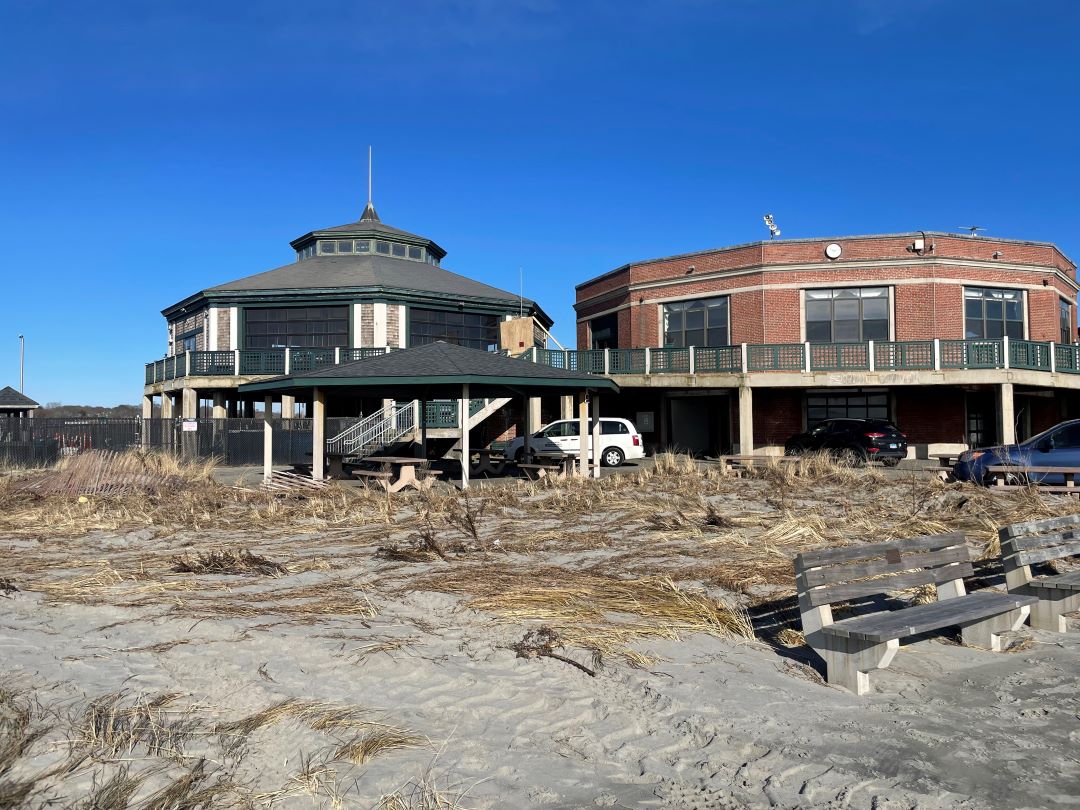Act On Climate: Legislators and Activists Offer Thoughts On Where R.I. Goes After Passing Highly Touted Climate Law
July 26, 2021
Sue AnderBois compares Rhode Island’s Act on Climate legislation to an annual New Year’s resolution to get healthier, but with the addition of a realistic path to achieving the lofty goal rather than a vague commitment that may fade over time as ambitions and daily reality meet.
The 2021 Act on Climate (AOC) bill signed by Gov. Dan McKee in April may still be the legislative version of an aspirational declaration, and there are varying levels of belief in whether the Ocean State will stick to its new environmental fitness routine, but legislators and activists focused on the global climate crisis agree Rhode Island has taken what is likely the biggest step toward shaping up the state.
Supporters say the law passed in March is an overdue update to the Resilient Rhode Island Act of 2014 that sets mandatory and enforceable targets for greenhouse-gas emissions, with implementation through legislation and community initiatives now the primary focus among its supporters.
The AOC is “the foundation, and sets the goal, for how we address climate change and then other climate and energy policies are how we get there,” said AnderBois, the climate and energy program manager for The Nature Conservancy in Rhode Island.
AnderBois, who spoke to ecoRI News before announcing her candidacy for Providence City Council, said the mandatory goals — including benchmarks to be met by 2030, 2040 and then 2050 — provide interim milestones that are easier to envision, and therefore more likely to be achieved, rather than simply telling the public, “By 2050 we have to be carbon neutral or net zero; good luck.”
AnderBois was joined by others who stressed the AOC is not a panacea, and those who hope to see its goals come to fruition also need to seek out other methods to achieve a healthier overall climate, including energy efficiency policies, appliance efficiency standards and a 100 percent renewable energy standard.
“While we’re waiting for the plan, we know there are some things we can do right now, like clean up our electricity system, invest heavily in energy efficiency,” she said. “There are a lot of things we know to do right now, and there are a lot great policy solutions that we can do while the plan is being made.”
AnderBois cited the Transportation Emissions and Mobile (TEAM) Community Act (S0872 and H6310) as one of the pieces of legislation pushing forward goals laid out in the AOC. The bill, which did not pass the General Assembly after being stopped in the House Finance Committee, would have established a cap-and-invest program to reduce transportation emissions 26 percent by 2032 in an effort to execute the regional Transportation & Climate Initiative (TCI).
Rep. Terri Cortvriend, D-Portsmouth, the House sponsor of the TEAM act, said the state needs to address carbon emissions from both the heating and transportation sectors, with heating likely to take more time.
“I do not think a plan in and of itself will produce tangible results,” she said. “It will be the state’s commitment to its successful implementation that will produce results.”
Cortvriend said she does not think the AOC will negatively impact Rhode Island businesses, a vocal concern among the bill’s opponents. Instead, she foresees “tremendous economic growth opportunities in the clean energy sector,” although the successful implementation of the climate goals requires the continued effort of those who carried it to fruition.
Capital resiliency
According to the website of the Center for Climate and Energy Solutions, a Virginia-based nonpartisan policy organization promoting renewable energy and the reduction of carbon emissions, “Climate resilience is the ability to anticipate, prepare for, and respond to hazardous events, trends, or disturbances related to climate.” It notes improving resilience involves assessing new and alternative climate-related risks and taking steps to respond.
Paul Tencher, a senior advisor to the Providence Resilience Partnership, said in Rhode Island the AOC provides an opportunity for engagement from government, businesses, institutions and consumers to “show concrete examples of how actions under the initiative can reduce emissions and make our state more economically resilient.”
Tencher said his organization’s goal is to help produce greater climate resiliency for Rhode Island’s capital. The partnership issued a report in February claiming about 7,000 small businesses in Providence are vulnerable to flooding resulting from the changing environment.
“Resiliency is not just about protecting property and communities. It is about preparing our capital city for the effects of climate change in a way that creates forward-looking economic opportunity,” Tencher wrote in an email to ecoRI News, adding that there needs to be advocacy for federal investments to help launch resiliency efforts.
Becoming more resilient and reducing emissions “must be accomplished on parallel tracks” as Providence faces storm surge, sea-level rise and extreme rain events among the climate challenges Tencher said could increase to “unmanageable levels” over the next two decades.
“Rhode Islanders need to see the economic benefits of climate action as soon as possible to build momentum for decades to come,” Tencher said, noting his organization aims to engage the community to develop a list of priority infrastructure projects with the help of scientists, engineers, planners, philanthropists, academics and business professionals advocating for resiliency investments.
“Our elected officials and advocates have staked an important claim by passing the Act on Climate,” he said. “There is still more work to do and this step will ensure climate change action will continue to be front and center.”
Meg Kerr, former senior policy director for the Audubon Society of Rhode Island, said AOC’s passage involved implementing amendments to the Resilient Rhode Island Act by tightening targets and making them mandatory.
“We are seeing the development of offshore wind, on-shore solar. We need to pay attention to siting of solar, maximizing opportunities to build solar in already-developed areas,” Kerr said. “And we need to make sure that offshore wind has the least impact as possible on wildlife. But we have to move ahead with these projects in order to stave off the worst impacts of climate change.”
The AOC includes a provision enabling lawsuits to be filed when citizens or organizations believe the state is not upholding its responsibilities under the legislation. The possibility of legal action was one of the major opposition arguments in the run-up to the law’s passage, but supporters note the lawsuits can only be used to call out state agencies and require they implement the law as written rather than to reap punitive awards.
In short, the AOC can’t be used to make money at the expense of taxpayers. Still, advocates remain aware of the lawsuit threat as a possible strategy for opponents to tar new bills proposed to meet the AOC’s goals.
“I hope we don’t see any lawsuits. I think having that language in the bill demonstrates that we are serious about the law and it can’t be ignored due to lack of staff and resources,” said Kerr, noting state agencies suffer from short staffing and a lack of resources, but those deficiencies should not deter a rapid transition to renewable energy that also demands government transparency.
“We need to hold government accountable to the requirements of the law. And metrics and tracking are clearly required,” said Kerr, joining other activists in stressing that work remains to achieve the law’s directives. “As environmental advocates, we need to push government and we also need to help government in order to be successful. We all need to step up to address climate change — the existential crisis of our lifetimes.”
AnderBois noted Massachusetts has a similar lawsuit provision in its own climate legislation, which she noted has only resulted in one lawsuit in the past 13 years.
“They were behind, got sued, caught right back up,” she said, comparing the lawsuit provision to a home fire extinguisher that will hopefully never be used, but “if your kitchen’s on fire, you’re going to be glad you have that.”
Step in the right direction
However, not everyone who backs the AOC is wholly supportive of its methodology or implementation.
“I don’t think it’s the best framework, but it’s better than nothing,” said Sen. Samuel Bell, D-Providence, one of the more progressive voices within the Democratic caucus.
Bell said the AOC addresses Rhode Island’s “complicitness in climate change” but is still not more than an “incremental step forward” in mitigating the manmade environmental crisis.
“It does help push us along in the right direction,” Bell said of the new law, but added he would prefer the state adopt the national Green New Deal plan pushed by progressive members of Congress, including the legislation’s sponsor and most prominent advocate, Rep. Alexandria Ocasio-Cortez, D-N.Y.
The Green New Deal resolution is a pledge to simultaneously address the climate crisis and improve the economic and social well-being of low- and middle-class workers. The justice-oriented resolution sets several goals, including powering the country with 100 percent renewable energy by 2030.
Bell lists several priorities he believes Rhode Island officials should purse, including establishing more state parks, removing polluting facilities from low-income neighborhoods, uprooting the highway from urban neighborhoods, regulating the natural-gas industry and levying fines when leaks are discovered, electrifying the state transportation system and the Rhode Island Public Transit Authority, mass generation of renewable energy, housing weatherization and overall pollution reduction.
Bell said he understands any of these steps are complicated and will require funding, but Rhode Island needs to take action to address its “shameful legacy” of pollution.
“Sometimes that is going to involve making business interests uncomfortable,” he said, adding that capitalism is not the only prospective speed bump in the adoption of AOC’s stated goals. Environmental regulations are already under the purview of what he perceives as a conservative bureaucracy left by former Gov. Gina Raimondo, a Democrat who departed the state earlier this year to become the Biden administration’s commerce secretary.
Act on Climate is implicit in the Rhode Island Constitution, but the state Supreme Court has not enforced those provisions in its rulings, Bell said, calling the court an “anti-climate” body with power over laws impacting the environment.
“It’s not a typical blue-state court,” Bell said, arguing this will continue to be a problem for the state in enacting climate measures.
Greg Gerritt, the longtime administrator of the Environment Council of Rhode Island (ECRI), agreed that the AOC is “probably not the best bill in the world,” but is a successful tool toward achieving the state’s current goals.
“It gives us clear targets that are mandatory. It makes a very strong case that we need to pay attention to environmental justice and community justice and frontline communities as we do this. That it’s going to need to be a holistic kind of thing. Climate justice is critical if we’re going to deal with climate,” Gerritt said, quipping that “50 million more things” could have been added to the law, but it nonetheless remains “adequate” for the next few years.
“Is it big enough to meet the whole problem? No. We’re going to have to come back and get an improvement in this in a few years,” he said. “And the group I work with, they’re ready to come back next year, and the year after, and the year after and keep seeking those improvements. You never get what you want, ever, and you never get it early in the process. You know, it took us seven years to get this one.”
Gerritt said lawsuit clauses written into bills are “a normal thing” and rarely used, noting that the Massachusetts lawsuit filed by the Conservation Law Foundation was simply a matter of using the courts to ensure the state enacted aspects of a measure passed by its lawmakers.
“The judge will say, ‘The law says this. Do what’s in the law,’” said Gerritt, noting that any Rhode Island lawsuit would follow a similar path. “It’s a pain in the butt to have to do it in court. We shouldn’t need to sue the state. The state should be doing all of this on its own. But when they don’t, we remind them.”
Gerritt stressed residents, especially those most affected by problems addressed in the legislation, need to remain involved in the implementation of programs and bills stemming from the AOC.
“Our low-income and communities of color are the ones who bear the brunt. They need to be part of the solution, and front and center on that solution,” he said, pointing to energy efficiency, climate resilience, protections for low-income communities and “the idea that we shall never build any more fossil-fuel facilities” as areas that should remain a focus of activists and legislators hoping to achieve singular and overarching goals.
“I think all those things are equally important and will all be worked on. And they will all be worked on separately and together,” he said. “Some of them will be one group carrying most of the load. Others, there will be a whole convergence of people and there will be more power towards that. But they all need to be worked on.”
The overall public sentiment in this moment is a call for quick and decisive action, according to Gerritt. He claimed this sentiment has been embraced by nearly everyone who is not paid to say otherwise, such as lobbyists for oil and gas companies and other industrial concerns deriving profit from environmental exploitation.
“Everybody knows we gotta make this transformation, and we need to make the transformation based on justice,” Gerritt said. “That’s just the reality.”
Binding targets
For the Green Energy Consumers Alliance, an ECRI member organization, the AOC was the organization’s primary legislative focus as the General Assembly returned to work following a year when most bills unrelated to battling the COVID-19 outbreak were set aside.
After the law’s passage in the spring, the alliance set three major policy goals, which met with mixed success during the rest of the General Assembly’s 2021 session. They included pushing for 100 percent renewable electricity by 2030 and extending and strengthening energy efficiency programs.
The AOC produces an opportunity for activists and state agencies to align on environmental initiatives and formulation of plans to achieve the law’s goals, said Priscilla De La Cruz, who recently relinquished her role as the consumer alliance’s Rhode Island director to replace Kerr as senior policy director for the Audubon Society of Rhode Island.
Kai Salem, a policy advocate for the Rhode Island/Massachusetts organization, said the strongest aspect of the AOC are the binding targets committing the state to action in five-year intervals.
“We’re going from having no governmental accountability to do anything on the climate crisis to a situation where we can be confident that the government will act on the climate crisis, and that if they don’t we can keep them accountable to doing so. That is a complete game changer,” Salem said.
The other significant aspect of the law is outlining a planning process for activists and other supporters, she said.
“The way to do climate action the best is to plan for it,” Salem said. “The legislation requires a planning process that is inclusive and ensures that we include frontline communities or workers who may need to be involved in a just transition. I am really looking forward to that planning process starting because that is now the key to making sure that we act on climate. Not just do it, but do it in the best way possible.”
Salem noted that an area lacking in the AOC is the absence of funding specifications for full-time positions focused on implementing the law’s various targets.
“We are strongly urging the governor and the administration to make those hires,” Salem said. “We would like to see a director-level environmental justice position at DEM [Department of Environmental Management], for example, and someone in the governor’s office who is coordinating all of this work.”
Including specific positions would have been difficult to include in the original bill, De La Cruz said, but that is the request they are now making to the governor.
“Resources are needed and coordination is needed at an administrative level,” she said.
De La Cruz, who is the ECRI president, echoed the sentiment of other environmental activists, including Gerritt, who said the AOC is not going to produce an immediate path to solving all of Rhode Island’s climate and environmental troubles.
“No bill is perfect,” she said. “I feel like the Act on Climate sets out to do what it’s intended to do, giving the state the tools it needs to do a good planning process and prepare the state to achieve those targets.”
Following the exhausting pandemic year of 2020, and the ongoing health and social issues resulting from COVID-19, AnderBois said she understands there can be a lag in the energy required to continue bringing about environment and climate advancements.
“I think it’s also easy to not realize how urgent the climate crisis is. We are just emerging from this terrible crisis of COVID-19 and people are burned out,” she said. “People are ready for some good news.”
In addition to focusing on individual issues and initiatives, there still needs to be an overall desire among activists and the community at large for continued action and results, even in the celebratory glow of Rhode Island’s largest and most progressive piece of environmental legislation.
“I hope people don’t think that just because Act on Climate passed means we’re done,” AnderBois said. “We are not done. That was just the foundation, there’s a lot more to do.”



